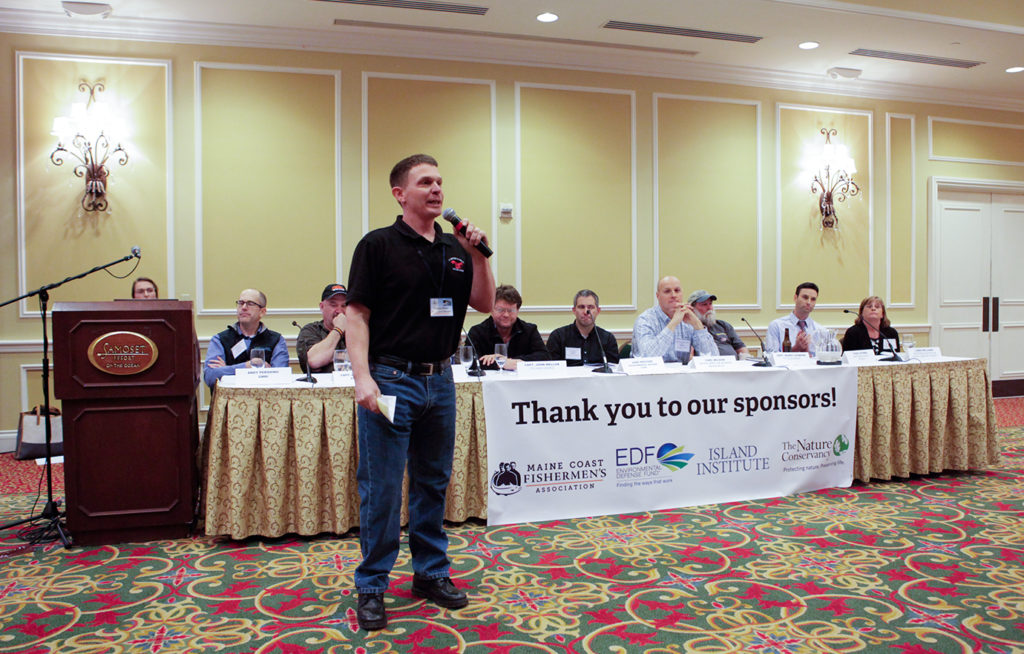What’s changing in the ocean, and how will it impact fishing?
Is there anything we can do about it?
What can Maine learn from the rest of the country?
At the Maine Fishermen’s Forum last week, three fishermen, Gerry Cushman, Kristan Porter, and Steve Train, held a 3 hour session on how fishermen from outside of New England are experincing a changing ocean and what we can expect to happen here in Maine. They hosted a conversation between fishermen, sceintists, and audience members on the panel entitled “Questioning Our Changing Oceans.” About 350 people attended the three-hour long session that was sponsored by the Island Institute, Environmental Defense Fund, The Nature Conservancy and Maine Coast Fishermen’s Association.
Here are some of the biggest takeaways from panelists:
- A lot of down, a little up. Gerry Cushman, a lobster fisherman from Port Clyde and president of the Maine Coast Fishermen’s Association explained that in 1995, some 38 million pounds of sea urchins were landed; in 2015, it was 1.9 million pounds. Scallops went from 1.6 million pounds to less than a half-million. The ground fish catch dropped from 30 million pounds to 1.8 million pounds. Shrimp was a 17 million-pound fishery in 1995, and now, “We’re going on year three without a shrimp season,” he said. On the plus side, the lobster catch was at 38 million pounds in 1995, and last year, topped 121 million pounds.
- Fishermen know what’s going on. John Bullard, northeast regional administrator for NOAA Fisheries, asked the panel what group could most effectively “get through to people” about the impacts a changing climate is having on the marine environment. He then answered that rhetorical query, saying, “I think fishermen are reliable observers of the environment.” Resource harvesters, perhaps more than scientists, can persuade the public that carbon pollution must be curtailed. Keith Colburn, of Deadliest Catch fame, said, “In Alaska over the last 30 years we have seen changes. In the last 15 years we have seen the warmest and coldest years in the last century. Three years ago you couldn’t get out of the ice. This year it was flat calm, I’m not sure how they made a TV show.” He added, “I became successful because I started to use science.”
- Climate isn’t weather. If the climate is changing, as almost all scientists agree, defining the terms of the discussion is important. Andy Pershing, chief scientist at the Gulf of Maine Research Institute, said climate must be distinguished from weather. “Climate is what you expect, weather is what you get,” he said. “I like to think of it more in terms of the odds,” Pershing continued, employing a gambling metaphor. It is more likely to see a gray, snowy day in February than in May.
- And climate change is happening, especially in Maine. Air temperatures have increased an average of .07 degree Fahrenheit since 1980, he said, while water temperatures in the Gulf of Maine have followed suit. “Right now, we’re at a record temperature at the 164-foot depth,” he said. In fact, the Gulf of Maine is warming faster than most of the world’s oceans.
- Ocean species are on the move. Jon Hare, an oceanographer with NOAA, said most species off the mid-Atlantic coast are moving northeast, likely a response to warming waters. “Maine faces significant challenges from climate change,” Hare said. “66 percent of species have high or very high likelihood to change productivity.”
- El Nino had a big impact this year. WCSH-TV meteorologist Todd Gutner addressed both weather and climate. El Niño, the continent-sized mass of warm water off South America, had first been observed in the late 1880s, he said. The 1997-1998 manifestation was the strongest version ever recorded, but the 2015-2016 version will likely top it. In Maine, the winter temperatures were about 3 degrees warmer than normal.
- The ocean is changing and fisheries are closing around the country. John Mellor, who fishes for Dungeness crab off San Francisco, shared a sobering tale. After spending a month repairing gear and paying crew in preparing for the season to start, regulators derailed his plans. “Domoic Acid levels were so high they closed the fisheries,” he said. “You guys are enjoying the lobster fishery, but you better keep a close eye on the water.” Buddy Guidon, who fishes for red snapper and other species out of Galveston, Texas, said land-based storms impact the Gulf of Mexico fishery.
- It’s not (all) inevitable. In the question period, panelists and participants expressed the urgency of the solving the problem. “We’re really dealing with warming for the foreseeable future,” said GMRI’s Pershing. NOAA’s Hare agreed: “We can’t really change the next 30-50 years.” Bullard of NOAA Fisheries sounded a call to action as the discussion ended: “We have the technology to solve this problem without breaking a sweat.”
Adapted from an article in The Working Waterfront. Read the full story here.


